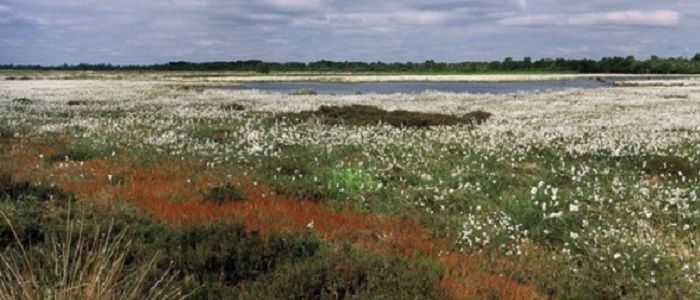UKRI funding for UofG led research to help achieve the UK's net zero target
Published: 4 December 2024
UofG led research that promises to bring about fresh thinking on land use change to help achieve the UK’s net zero target has received funding from UK Research and Innovation (UKRI).

Researchers from the University of Glasgow's College of Arts & Humanities are part of a team leading an innovative project that promises to bring about fresh thinking on land use change to help achieve the UK's net zero target.
The project has received £4.5 million in funding from UK Research and Innovation (UKRI).
The “Rapid Engagement with Stressed Peatland Environments and Communities in Transformation” (RESPECT) project will produce data, methods, landholder tools and proposals for governance reforms to change agricultural practices on peatland, and reduce emissions from land use.
The project is a collaboration between the University of Glasgow and the Universities of Newcastle, Hull and Stirling.
Professor Nicki Whitehouse, an archaeologist from the University of Glasgow's School of Humanities | Sgoil nan Daonnachdan, is part of the project team.
She said: “I'm really excited to see the importance of the historic environment being recognised in land-use decision-making. The archaeological research will not only inform land-use decisions where there are vulnerable archaeological deposits through historic environment sensitivity mapping, but we will also contribute by using historic data to understand patterns of peatland distribution and depth to understand their changing carbon stocks. Historic land-cover maps using archaeological and pollen records will also allow us to quantify optimal land use under different past climate scenarios and help us identify areas for restoration within the case study regions under different future climate scenarios.
"I very much look forward to working with my colleagues on this project and especially our historic environment project partners Historic Environment Scotland, Historic England, National Trust and National Trust for Scotland."
Professor Jill Robbie, from the School of Law, is the Project Investigator. She said: “This project will produce new thinking and research to facilitate landholders to deliver land use change for net zero and manage emerging land use conflicts.”
RESPECT will collate data through novel interdisciplinary collection, modelling and engagement methods. These data will establish the capacity of land and land users to contribute to the net zero target, as well as generate other social and environmental
co-benefits, balanced against conflicting land use demands, within the context of climate change.
The baseline data will inform the production of a Peatland Triage Tool, providing decision-support for landowners, land managers, farmers and crofters seeking to undertake peatland restoration.
Governance reforms will be proposed to scaffold the social innovations necessary for transformative change. Two case study regions - the Forth and Humber Catchments in Scotland and England - will be investigated in-depth, where tensions exist between food production, historic environment preservation, carbon sequestration and ecological restoration.
RESPECT will work closely with separately funded UKRI initiative, the Land Use for Net Zero Hub: Lunzhub.com. Established in November 2023, the LUNZ Hub is working to provide all four UK administrations with the rapid evidence they need to develop policies that will drive the UK land transformation required to achieve Net Zero by 2050, alongside other environmental targets.
The project team consists of:
University of Glasgow
Prof Jill Robbie (Project Investigator)
Dr Adrian Bass
Prof Deborah Dixon
Dr Jiren Xu
Dr Katherine Simpson
Prof Larissa Naylor
Prof Nick Hanley
Prof Nicki Whitehouse
Newcastle University
Dr Amy Proctor
University of Hull
Prof Graham Ferrier
Dr Jane Bunting
University of Stirling
Prof Jens-Arne Subke
First published: 4 December 2024
<< Latest news

